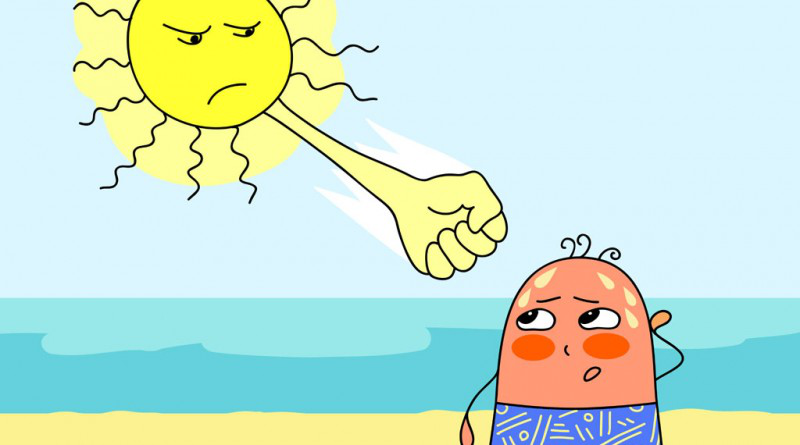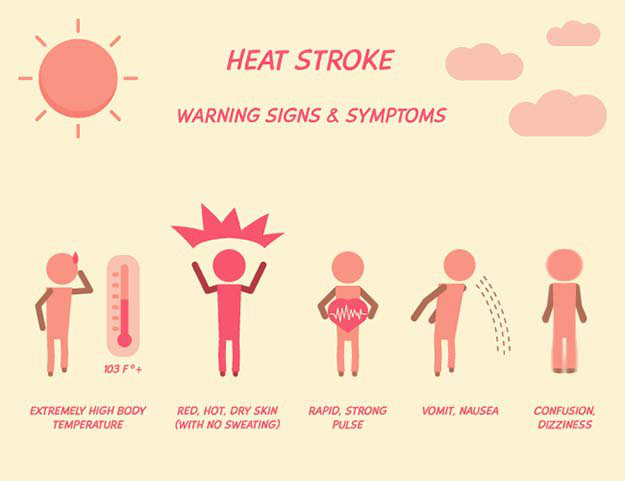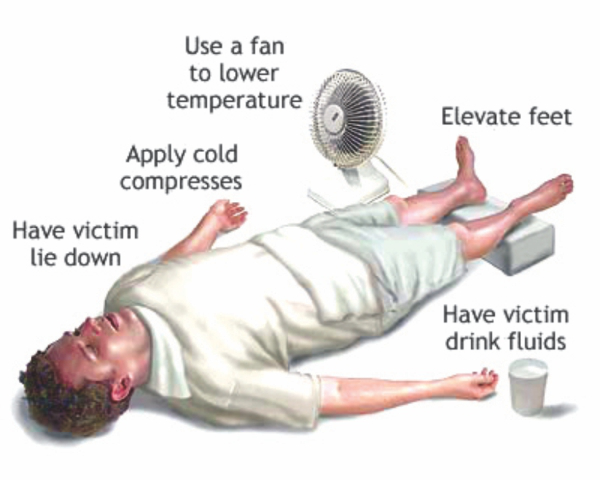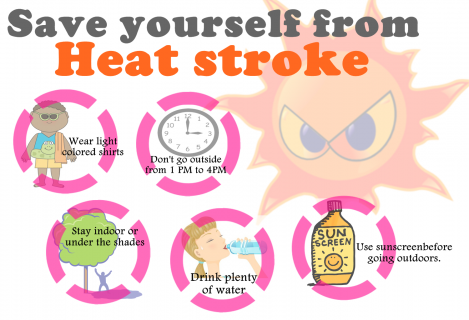
Heat Stroke
Heat stroke, sometimes also referred to as Sunstroke is a condition caused by overheating of your body accompanied by dehydration that happens usually as a result of prolonged exposure to or physical exertion in high temperatures.
It is a life-threatening condition where the body temperature rises above 104 F or higher. Heat stroke can be fatal and can damage your brain, kidney, heart and muscles. If left unattended it can pose serious complications or death.
Symptoms of Heat Stroke
A body temperature of more than 104 °F is Hallmark symptom of Heat Stroke. However, some individuals can develop symptoms of heat stroke suddenly and rapidly without warning. Common symptoms include:
- Dizziness
- Nausea and vomiting
- Hot and dry skin
- Lack of sweat despite the heat
- Strong or weak rapid heart beat
- Shallow breathing
- Altered mental behavior: Confusion, Disorientation, Irritability, Delirium and Slurring of Speech
- Seizures and unconsciousness

People at Risk
Heat Stroke is most likely affects elderly (Age above 50years) and children (Below 4years). The reason behind this is that they adjust to heat slower than young individuals. Apart from them, heat stroke can also affect young athletes, outdoor workers. However, it can also affect individuals who don’t drink enough water, having a chronic disease or drink an excessive amount of alcohol. Leaving infants, children or animals in cars poses a risk for heat stroke. Even in moderate weather, the temperature inside a closed car can reach dangerous levels.
Causes of Heat Stroke
Our body normally generates heat as a result of various metabolisms, which is usually dissipated in the form of sweat. In some conditions of extreme heat, high humidity and vigorous physical exertion under the direct sun the body may fail to dissipate this heat as a result of which the body temperature rises.
- Hot Environment: It is non-exertional or classic heatstroke that happens due to exposure to hot, humid weather, especially for prolonged periods, such as two or three days. It occurs most often in older adults and in people with chronic illness.
- Dehydration: Lack of adequate fluid intake can result in Heat stroke. This happens as the body fails to sweat enough to dissipate the heat which ultimately causes a rise in body temperature.
- Strenuous activity: This happens due to increase in body temperature brought on by intense physical activity in hot weather. Labors and people doing field job who are not exposed to high temperature are most likely to be affected.
- Too much of Alcohol and caffeine Intake: Too much intake of alcohol and caffeine adds up to the dehydration and affects your body’s ability to regulate body temperature.
- Wearing the wrong fabric: Wearing clothes that prevent sweat from evaporating easily and cooling down your body.

First aid for Heat Stroke
Victims of heat stroke must receive immediate treatment to avoid permanent organ damage.
First and foremost, cool the victim.
Get the victim to a shady area, remove clothing, and apply cool or tepid water to the skin (for example, you may spray the person with cool water from a garden hose), fan the victim to promote sweating and evaporation, and place ice packs under the armpits and groin.
If the person is able to drink liquids, have them drink cool water or other cool beverages that do not contain alcohol or caffeine.
Monitor body temperature with a thermometer and continue cooling efforts until the body temperature drops to 101 to 102 F (38.3 to 38.8 C).
Always notify emergency services (080 -4926 1198) immediately. If their arrival is delayed, they can give you further instructions for treatment of the victim.
Things to Avoid in This Summer
- Switch on to loose-fitting and light color clothes. Wear clothes that allow your skin to breathe and your sweat to evaporate.
- Protect yourself against Sunburn: Use sunscreen, sunglasses, wide beam hat, caps or umbrellas.
- Avoid becoming dehydrated, drink plenty of fluids. Always carry a bottle of water with you when you step out of the house.
- Avoid sugary and alcoholic beverages to rehydrate your body.
- Avoid vigorous physical activities in hot and humid weather.





